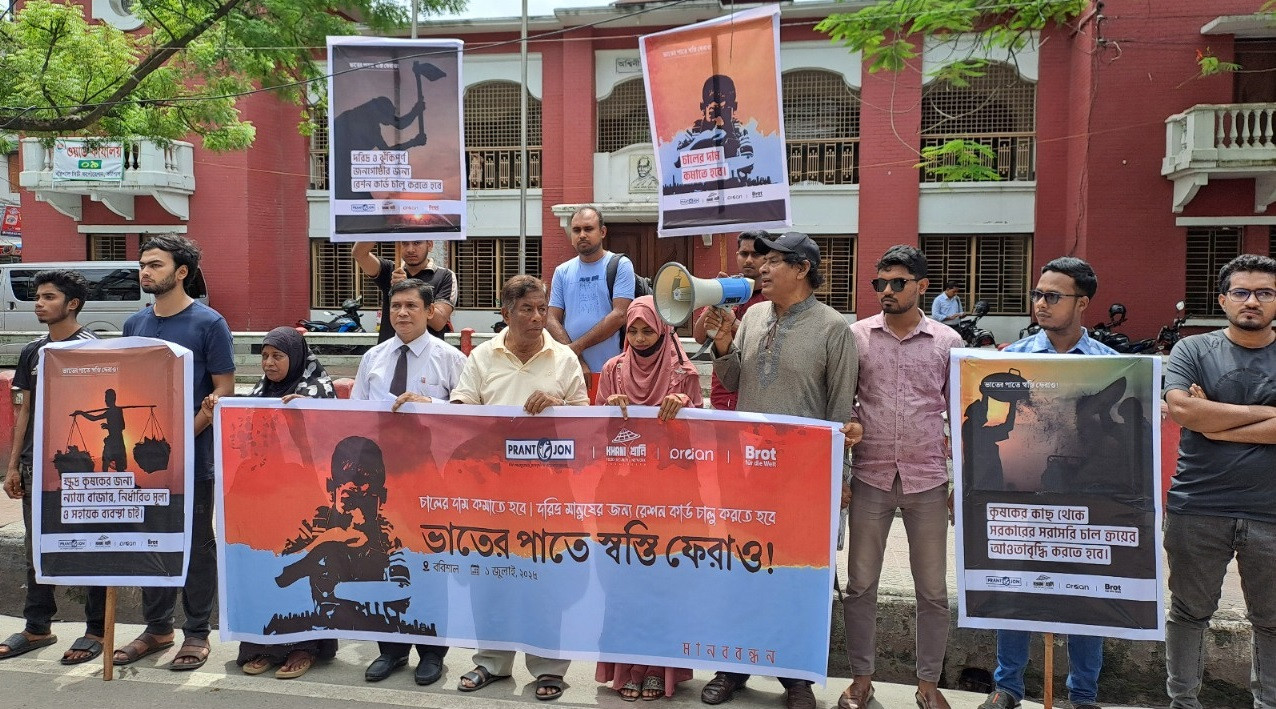Staff Correspondent
Published:2025-07-01 20:58:11 BdST
KHANI raises alarm over rice price hike, inflation
The Bangladesh Food Security Network (KHANI) has sounded the alarm over an escalating food crisis caused by an unusual hike in rice prices and ongoing inflation, which has severely impacted the daily lives of millions across the country.
Following Eid-ul-Adha, rice prices surged dramatically, contributing to nearly 40 percent of the overall food inflation in May, according to updated data from the Planning Commission.
This spike has occurred despite adequate production during the recent Boro harvest, prompting questions about market irregularities and policy enforcement.
In response, KHANI and its member organisations staged simultaneous human chain demonstrations in Dhaka, Rajshahi, Khulna, Barisal, Sylhet, Rangpur, Mymensingh, and Noakhali under the slogan “Bhaater Paate Swasti Pherao” (“Restore Comfort to Every Plate”). Participants from diverse backgrounds—including farmers, rickshaw pullers, activists, journalists, and civil society representatives—called for immediate government intervention to stabilise food prices and ensure food security for all.
At a demonstration in Mymensingh, farmer Johar Ali expressed frustration, saying: “We sell our rice to moneylenders at a low price, then buy it back at a high price. Who is protecting our rights?” Rickshaw puller Sikandar echoed this sentiment, stating, “Half of my daily earnings go to buying rice. We want it at Tk 40 per kg.”
In Noakhali, KHANI General Secretary Nurul Alam Masud warned of widespread nutritional decline: “People are forced to survive on rice alone, excluding vegetables, fish, and meat from their diet. This imbalance will lead to malnutrition and deteriorating public health, particularly affecting children and the elderly.”
UN food agency data cited by KHANI reveals a dire reality: around 20% of the population in Bangladesh suffers from food insecurity, and nearly 30% cannot afford essential food items. For low-income households, this rate climbs to 36%, with nearly a third of families cutting back on food expenses to cope with rising costs.
KHANI has put forward five urgent demands:
> Expand direct government procurement of rice from farmers.
> Introduce a nationwide rationing system for the poor and vulnerable.
> Safeguard smallholder farmers through improved access to markets and fair pricing.
> Broaden the coverage of TCB and OMS operations for targeted food assistance.
> Enforce stronger monitoring to curb price manipulation and market syndicates.
In Barisal, CAB Secretary Ranjit Dutta attributed the crisis to “unstable paddy prices, rising milling costs, illegal stockpiling, and weak surveillance”, stating: “We must reduce the food burden on households to ensure access to nutrition for low-income communities.”
As nationwide discontent grows, KHANI urges the government to swiftly act on these demands to prevent further deterioration of food security and uphold the fundamental rights of all citizens.
Unauthorized use or reproduction of The Finance Today content for commercial purposes is strictly prohibited.


